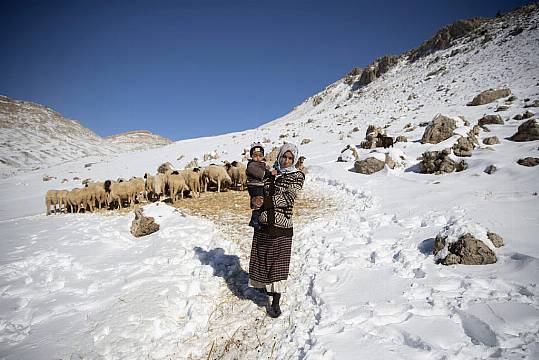Heavy snow in the Atlas mountains of Morocco has left nomadic tribes cut off.
Amazigh tribes living in the mountains rely on sheep that graze the lush forests around the village of Timahdite, which sits at an altitude of 5,900 feet.
But as winter sets in, they are gradually cut off from the world.
The mountains, known for their red-shaded soil, give way to what seems like an endless white. The isolation remains until the road leading to the village is reopened by local authorities’ tractors. But they are often delayed.

After just a week under the season’s first snowfall, the pool and football tables that youths pass the time with are fully covered. The sheep are tucked together in a small barn for days.
When the snowy weather finally recedes, families try to resume their lives. Children trek along the winding roads to reach the nearest school.
While most of the men resume work in nearby towns, women carry the weight of village life.
They chop wood from a nearby forest that is used for heating, bake Amazigh bread from flour that had been stored weeks in advance for winter.
In the afternoons, they walk or ride donkeys to nearby lakes or water sources and wash clothes that can finally dry in the sunlight. Sometimes, they carry on the shepherd’s role too.
Heavy rain and snowfall is generally welcomed in Morocco, a coastal country on the edge of the Sahara with few sources of fresh water.

Farmers look forward to the rainy season as agriculture depends on storing rainwater in dams, and prices of vegetables and fruit can be affected by levels of rain.
But for people like Aqli Fatima, standing in her home as her daughters feed the chickens and clean a rug, winter weather brings hardship.
In spite of her family’s best efforts, using bricks or nylon bags, water from rain and melted snow leaks into their small living room.
“It’s like this every year, there is nothing to do but pray.”
Mohamed Miloud sits in his home as his children are dropped off in a school transport vehicle. A solar panel is perched on top of his brick home as his daughter Ihsan peeks out of the door.
“Maybe things will be better for them,” he says.







